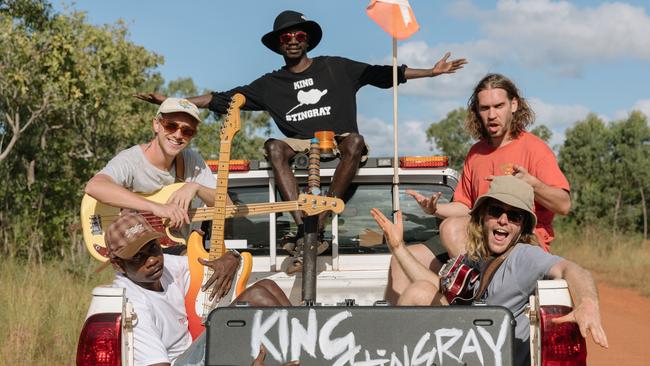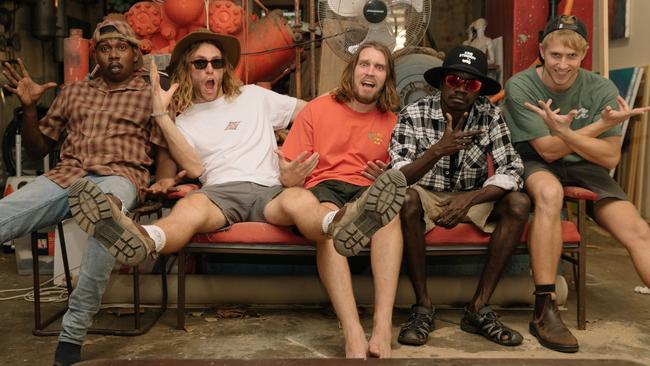King Stingray stand on the shoulders of Indigenous rock giants with their exciting new sound
The musical DNA is strong in emerging Yolŋu surf rockers King Stingray whose fathers and grandfather starred in Yothu Yindi and the Warumpi Band.
Music
Don't miss out on the headlines from Music. Followed categories will be added to My News.
Lifelong friends Roy Kellaway and Yirrŋa Yunupiŋu were North-East Arnhem bush kids, kicking a footy around the oval and dodging snarling camp dogs while their elders wrote songs for Yothu Yindi.
The musical DNA would prove to be strong in both of them; singer and songwriter Yunupiŋu is the nephew of the late musician, educator and 1992 Australian of the Year, Dr M. Yunupiŋu, and Kellaway’s father Stuart is the bassist and co-founder of Yothu Yindi.
“I remember definitely being on the road with them for Australian gigs,” Kellaway recalls. “But I never went overseas with the band.
“A big part of growing up was just having musos around and hearing their stories about playing music at awesome festivals.
“I used to get the best toys when Dad would come off tour from Japan or Switzerland or wherever; I had this full silk Aladdin suit he got from somewhere and I just never took it off even though we were in the hot tropics and I was sweating everywhere.”

So there was clearly some destiny at play when Kellaway and Yunupingu formed King Stingray and recruited mates Dimathaya “Dima” Burarrwanga, Campbell Messer and Lewis Stiles to create the “Yolŋu surf rock” sound which has captivated Australia’s alternative music fans for the past two years.
From their debut single Hey Wanhaka, through Triple J Hottest 100 hits Get Me Out and Milkumana, the band has quickly established itself as one of the country’s most exciting new acts.
Hailing from rock royalty may have piqued the curiosity of the Australian music industry but as Kellaway points out, it is their particular blend of Indigenous and English language, yidaki (didgeridoo) and guitar rock which has struck a chord with young fans.
“We have a younger following, the Triple J crowd, and a lot of those people don’t even know who Yothu Yindi are,” he said.
“Obviously that is a big part of our story and keeping that legacy going is definitely what we’re doing but we do feel we are celebrating culture in our contemporary way.”
Kellaway and Yunupiŋu started King Stingray in the small coastal town of Yirrkala, jamming in the local community “shed”, with the modest goal to record a few songs.
At home, rock music – alongside traditional Yolŋu songlines – was the prevailing soundtrack; the pop culture dominance of hip hop and R&B wasn’t on their radar.

“I think deep down we just naturally love rock music, the energy of it,” Kellaway says.
“We have musos we look up to – George from Warumpi Band was Dima’s grandfather – but I don’t think we thought about it too much. I just love surf music and in particular, surf guitar.”
It was tough for the young rockers to imagine being able to play gigs further afield; it’s a 12-hour drive just to get to Darwin and a plane ticket to Brisbane cost more than $2000.
But the DIY attitude of the young rockers – and much-needed grants – helped propel their mission to introduce their songs and culture on the tours of The Chats, Midnight Oil and Ball Park Music and at festivals including Dark Mofo and Splendour In The Grass.
And record the 10 songs on their self-titled debut album released on August 5.

“There’s obviously challenges you have with being in a band that’s so remote,” Kellaway said. “When The Chats got wind of Hey Wanhaka, they asked us to support them but we couldn’t do their whole tour because it’s just so expensive – it’s over two grand just for one person to go from Gove to Brisbane, so you need to have a fair bit of financial backing to get things going.”
The five musicians have been quickly welcomed into the wider Australian music community; there are no lack of offers for them to join tours while superfans in their comments run from newly minted Senator David Pocock to indie rock heroes Dune Rats.
Kellaway insists the only reason King Stingray exists is because of the pure joy the five men feel making music together, whether creating it in the shed or performing it in front of an audience.
Yet you can sense “King Sting” are part of a bigger cultural movement, as evidenced by the huge reaction the band received for their set at the recent Splendour In The Grass festival.
Thousands trudged through the mud fields to make their early opening set at the GW McLennan tent last Sunday; you can guarantee in three years, about 100,000 people will be claiming they were there.
And for the five men who performed on a stage with a history of career-making sets, there was an abundance of pride in hearing thousands of Australians sing back their Yolŋu lyrics and connect with songs about their north East Arnhem home, caring of country, road trips and those angry camp dogs.
“That’s a massive part for Yirrŋa and Dima as well, to educate and showcase such a strong, rich culture from this very small part of the world – they’re really proud to share,” Kellaway said.
King Stingray are also up for Artist of the Year and Song of the Year for the 2022 National Indigenous Music Awards held in Darwin on August 6.
For all tour dates, kingstingrayofficial.com





